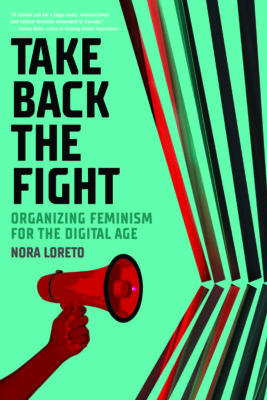These days, feminism seems ubiquitous. To peruse Instagram, one would think that #feminism is thriving and has only gotten stronger in Canada. What were struggles for previous generations – the right to vote, access to reproductive justice, paid maternity leave – have since become gains that women, non-binary, and gender non-conforming folks can enjoy thanks to the organizing and determination of a once-formidable movement. Now, everyone and their uncle might well be self-declared feminists. But as writer, activist, and podcaster Nora Loreto thoroughly explores in Take Back the Fight, organizing around the feminist cause in Canada has waned without large-scale social movement building. More perniciously, who and what is even considered “feminist” has been defined by corporate and political interests that would be reluctant to actually engage with feminism’s world-changing possibilities.
Neoliberalism is the main culprit in this sanitization of the movement’s potential. The erosion of social programs, decline in labour organizing, and atomization of community that are the result of decades of capitalist, white-supremacist technocracy have hollowed out what was once a more coherent and cohesive movement. Loreto digs up episodes of feminism’s Canadian context involving important feminist leaders of the past and present, such as Rosemary Brown, Françoise David, and Harsha Walia, giving momentum and spirit to the text while highlighting the movement’s shift in impact.

Take Back the Fight
Organizing Feminism for the Digital Age
Nora Loreto
Fernwood Publishing
$25.00
paper
200pp
978177632414
If Loreto hopes to inspire new and casual feminists to find ways to “put their feminism into action,” she does not see great potential in the digital turn to help. Isolation, doxing, the lack of locations for real and earnest debate, undemocratic platforms, hashtag feminism: these are all deterrents to feminism actually moving the dial on issues. Digital-era events such as #MeToo are accused of raising awareness without making the leap to disruptive organizing across many locations with a supportive and regenerative core. “Action is the only way that social change is made possible,” she says, but we must move beyond our devices and agitate in plural ways.
Keenly attuned to our current moment’s ethical timbre, Loreto is unflinchingly committed to presenting feminism’s anti-capitalist, anti-colonial, and anti-racist imperative. She makes the connection between societal struggles and the possibilities of a truly emancipatory feminist movement that gathers all people under its cover in solidarity. For instance, if caring for children is one of the basic tenets of feminism, then we must organize to make our governments consider all children, placing issues such as Indigenous healthcare and access to drinking water as central to its work. Canada’s historically white feminism is consistently shaken up to reveal its narrow scope and harmful limitations.
Loreto makes the case again and again for a better understanding of movement building and collective ideation as the path for feminism to live up to its potential. If there’s one shortcoming in the book, it is that the bottom line of real-world and in-person organizing is absolute and can seem hopeless to readers in the midst of our present global health crisis. If taking back the fight must happen in person, then feminism will remain undermined by its digital hindrances. Yet it is possible for the movement’s strengths to show us a way through the COVID era to a time when this work’s lessons can be applied in earnest. mRb






0 Comments